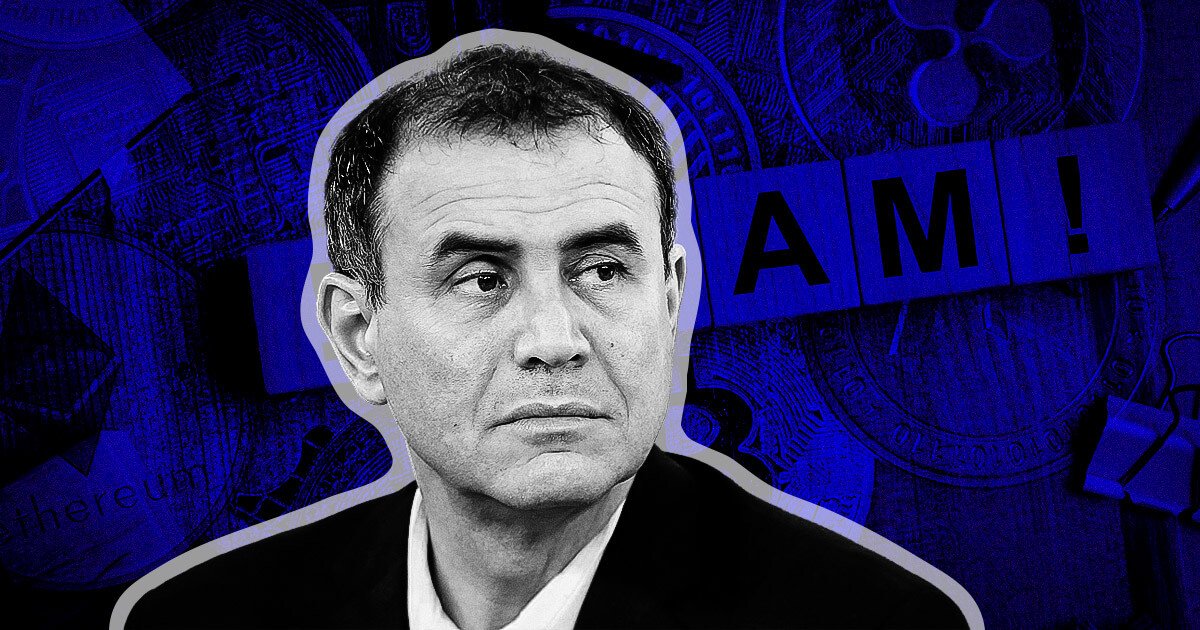Dr. Nouriel Roubini, an economist renowned for his prescient warnings about the 2008 financial crisis, remains a prominent critic of cryptocurrencies, even amidst a significant market rally. While Bitcoin and other digital assets experience unprecedented gains, Roubini dismisses their value, citing volatility, lack of intrinsic utility, and potential for systemic risk as major concerns.
The Case Against Crypto
Roubini argues that cryptocurrencies fail as reliable stores of value due to their extreme price swings, which undermine their utility for payments or savings. He compares crypto’s speculative nature to historical bubbles, asserting that even tulips—famously associated with the Dutch tulip mania—offered more utility than many cryptocurrencies. Crypto Despite Record : According to Roubini, crypto assets lack income streams or tangible use, making them speculative rather than sound investments .
Nouriel Roubini extensively criticizes cryptocurrencies, highlighting their speculative nature and systemic weaknesses. Bitcoin and comparable assets are too volatile to function as currencies or long-term investments, he claims. Cryptocurrencies are speculative, while traditional financial assets provide income or have inherent utility. They are similar to previous bubbles like tulip mania .
Roubini notes major crypto ecosystem structural difficulties. He says mining power and money are concentrated in a few hands, despite assurances of decentralization. Crypto enthusiasts espouse democracy, yet this centralization goes against it. Poor regulation in the crypto industry has resulted in price manipulation, fraud, and hacking, causing distrust in the system .
Inefficient blockchain-based systems compared to faster, cheaper, and more secure centralized banking networks, Roubini says. He also worries about cryptocurrency mining’s environmental impact because to its high energy use. Roubini views cryptocurrencies as speculative and defective, recommending caution for investors and policymakers .
Crypto Versus Traditional Financial Systems
The economist contrasts cryptocurrencies with traditional financial systems, which he deems more scalable and secure. Crypto Despite Record : For instance, centralized systems like banks and credit cards offer protections against theft and fraud, whereas losses in the crypto realm—such as stolen private keys—are irreversible. Roubini asserts that the promises of decentralization and democratization often touted by crypto proponents have not materialized, with wealth and power concentrated in the hands of a few “whales” .
 Nouriel Roubini contrasts cryptocurrencies with established banking systems to highlight crypto ecosystem flaws. The extraordinary price volatility of cryptocurrencies like Bitcoin weakens their reliability as repositories of value or mediums of exchange, he says. Traditional systems like fiat currencies and central banks offer stability supported by regulations and monetary policies.
Nouriel Roubini contrasts cryptocurrencies with established banking systems to highlight crypto ecosystem flaws. The extraordinary price volatility of cryptocurrencies like Bitcoin weakens their reliability as repositories of value or mediums of exchange, he says. Traditional systems like fiat currencies and central banks offer stability supported by regulations and monetary policies.
Roubini also disputes crypto’s decentralization narrative, arguing that mining power and riches are concentrated around a few large entities, undermining claims of democratization. Despite their flaws, traditional financial systems offer deposit insurance and regulatory control. The irreversibility of crypto transactions makes fraud and hacking more likely.
Roubini also thinks bitcoins are inefficient compared to credit cards and digital banking, which execute transactions faster, more securely, and cheaper. He worries that the crypto market’s regulatory ambiguity allows money laundering and tax evasion, undermining its validity. Roubini prefers established systems for their scalability, security, and history of meeting global economic demands.
Broader Economic Implications
Roubini’s skepticism extends beyond individual investors to institutional portfolios. He cautions against including highly volatile assets like Bitcoin in serious investment strategies, labeling many retail investors as victims of hype and misinformation. He advocates for traditional safe-haven assets like gold, inflation-indexed bonds, and real estate as more reliable hedges against economic instability . Nouriel Roubini’s cryptocurrency critique raises concerns about financial stability and investing strategy. Crypto Despite Record : He claims that Bitcoin and other volatile assets are unsuited for institutional portfolios or serious financial planning.
Roubini stresses the crypto market’s unregulated systemic hazards. Price manipulation, fraud, and “whales” centralized authority harm cryptocurrencies’ decentralized nature. Centralized exchanges increase vulnerability to hacking and mismanagement, potentially undermining the financial ecosystem . Roubini advises institutional investors to prioritize gold, real estate, and inflation-protected bonds. He calls Bitcoin a speculative bubble, yet these assets hedge inflation and economic uncertainty. Roubini cautions that the rising popularity of crypto may distract from tackling global economic challenges including debt and inflation .
For More : Why Fails to be the Price of Bitcoin Crashing Today?
Conclusion
Roubini’s views highlight the global financial ecosystem dispute about digital assets, notwithstanding bitcoin markets’ surge. Crypto supporters praise its promise as a decentralized financial alternative, while Roubini warns of its volatility, regulatory uncertainty, and speculative character. For now, he recommends investors to prefer stability and demonstrated worth over speculation. Contrary to the hoopla, this position advises digital finance professionals to be cautious.
Despite the market’s resurgence, Nouriel Roubini calls cryptocurrencies speculative and risky. Due to their volatility, lack of value, and structural issues, he does not recommend them for serious financial planning. Cryptocurrencies are less stable than gold or inflation-protected bonds during economic upheaval.
Roubini cites systemic issues including crypto manipulation and poor regulation. Crypto Despite Record : He thinks these flaws violate decentralization and openness claims. Retail investors risk financial losses due to power concentration among major holders and mining businesses.
Roubini thinks cryptocurrencies distract from inflation, debt, and financial system inequalities. He prefers investing in stable, valuable assets over hype-driven speculation. Roubini warns against the crypto market’s ascent and encourages moderate financial innovation.
[sp_easyaccordion id=”2518″]









